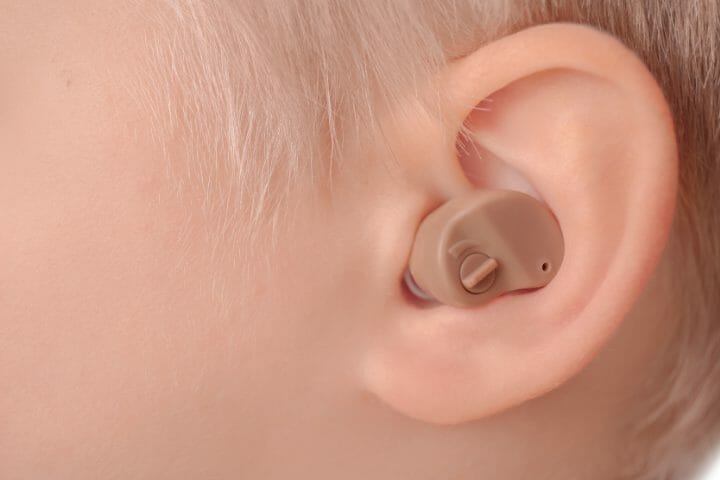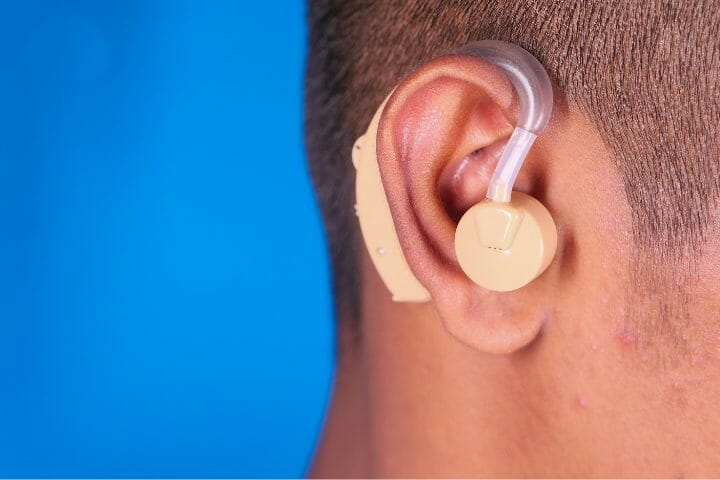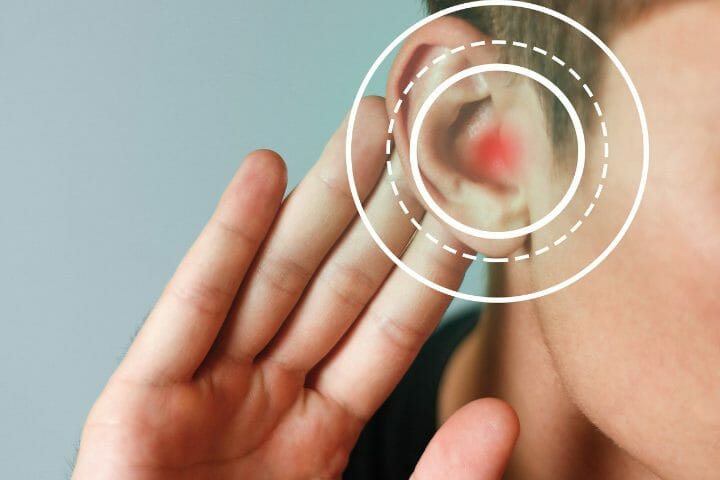Hearing loss affects 1 in 10 people in the United States. But is hearing loss a disability? What kind of benefits can you get and what records will you have to show in order to qualify for it? We explore all this in-depth in the article below.
Contents
There is a lot of debate on whether or not hearing loss should be classified as a disability. On the one hand, those who argue that it is a disability say that it limits someone’s ability to participate in everyday life activities, such as hearing and communicating with others.
However, others argue that hearing loss with age is just a part of the aging process and not something that should be labeled as a disability.
However, the WHO estimates that unaddressed hearing loss costs USD 980 bn every year, so clearly, it is a big problem. In the United Sates, hearing loss has higher prevalence than cancer or diabetes.

Almost 30 million people in the United States above the age of 12 have hearing loss in both the ears. This disability sometimes affects their normal life. It prevents adults from working normally in an office or workplace.
Learn more about how to qualify for disability benefits based on hearing loss and how to start the application process.
Deafness And Hearing Loss
Most people with deafness or hearing loss have a condition that is present from birth or develops in early childhood. However, hearing loss can also occur later due to disease, injury, or exposure to loud sounds.
There are three main types of hearing loss:
- Conductive Hearing Loss is a condition where sound waves cannot reach the inner ear. This deafness or hearing loss can often be corrected with medical treatment or surgery.
- Sensorineural Hearing Loss happens when the hair cells inside the inner ear are damaged. This deafness or hearing loss is usually permanent and cannot be corrected with medical treatment or surgery.
- Mixed Hearing Loss, as the name suggests combines the ill effects of both sensorineural deafness and conductive hearing loss.
Deafness is essential profound hearing loss (where the person has 90% or more hearing loss). It can make it challenging to communicate with others, learn new information, and participate in activities that require a hearing.
Several services and devices can help people with deafness or hearing loss communicate and participate more fully in life. People with deafness or hearing loss can lead happy, productive lives with the proper support.
You might also like to read: Can You Get Disability For Thyroid Disease?
Causes Of Hearing Loss And Deafness
There are several different causes of hearing loss and deafness. Some of the more common ones include:
- Age: As we age, our hearing often deteriorates. This is particularly common in those over the age of 60.
- Genetics: Hearing loss can be hereditary, meaning it can run in families. If you have a family member with hearing loss, you may be more likely to experience it yourself.
- Illness: Several illnesses can lead to hearing loss or deafness, including meningitis, mumps, and rubella.
- Injury: Injury to the head or ear can also cause hearing loss or deafness. This might occur due to loud noise, such as an explosion, or physical trauma to the head or ear.
- Congenital disabilities: Some babies are born with hearing loss or deafness due to abnormalities in the development of their ears.
- Disease: Several diseases can lead to hearing loss or deafness, including diabetes, HIV/AIDS, and syphilis.

If you are experiencing hearing loss or deafness, it is essential to see a doctor so that the cause can be determined and treated appropriately.
In some cases, hearing loss or deafness is permanent, and nothing can be done to improve it. However, treatment may be possible in other cases and could help improve your condition.
Is Wearing a Hearing Aid Classified as Disability?
No, wearing a hearing aid is not classified as a disability. However, hearing loss itself is considered a disability, and people with hearing loss may be eligible for benefits from the Social Security Administration (SSA).
To qualify for benefits, your hearing loss must be severe enough to interfere with your ability to work. The SSA will also consider other factors, such as your age, education, and work experience. If you think you might be eligible for benefits, you should contact the SSA to learn more.
What Percent Of Hearing Loss Qualifies As Disability?
The government has legally defined 40% hearing impairment as equivalent to that of a Person with Disabilities (PDR). This means they are entitled to full participation and equal opportunity in all areas, including protection from discrimination.

Social Security Disability Benefits For Hearing Loss
If you’re unable to work because of hearing loss, you may be eligible for Social Security disability benefits. To qualify for benefits, you must first have worked in jobs covered by Social Security and paid Social Security taxes.
It would help if you also had a severe hearing impairment that meets the requirements of the Social Security Administration (SSA).
Generally, the SSA will consider your hearing loss to be severe if it:
- It affects your ability to communicate effectively in spoken language
- It is accompanied by a word recognition score of 40% or less using the Hearing in Noise Test (HINT)
- It is accompanied by an auditory threshold of 50 decibels or more in your better ear as measured by pure tone audiometry
If you think you may be eligible for Social Security disability benefits, you can apply online at www.ssa.gov or call 1-800-772-1213.
You might also like to read: Is Asthma a Disability? Your Questions Answered
Blue Book Eligibility
If you have hearing loss that is severe enough to prevent you from working, you may be eligible for Social Security disability benefits.
The Social Security Administration (SSA) has a unique “Blue Book” listing for people with hearing loss. Your hearing loss must meet specific criteria to qualify for benefits under this listing.
To be eligible for Social Security disability benefits due to hearing loss, your condition must meet the requirements laid out in the SSA’s “Blue Book.”
To qualify under the Blue Book listing for hearing loss, you must have bilateral (meaning in both ears) hearing loss that is sensorineural (meaning damage to the inner ear or nerve pathways) and severe. Your hearing loss must also be measured by audiometry testing to show that it meets certain thresholds.
Suppose you do not meet the specific criteria in the Blue Book listing for hearing loss. In that case, you may still be eligible for disability benefits if your hearing loss prevents you from working.

In this case, your claim will be decided using a medical-vocational allowance. This allowance considers your age, education, past work experience, and any other limitations you may have due to your hearing loss or other medical conditions.
Tips on Applying for Disability with Hearing Loss
If you’re deaf or hard of hearing, you may be eligible for Social Security disability benefits. Here are a few tips to help you through the application process:
- Get professional help. The Social Security Administration (SSA) recommends that you have someone help you with your application, such as a lawyer, advocate, or another representative. This person can help ensure that your application is complete and accurate and can represent you during the appeals process if your claim is denied.
- Gather all the necessary documentation. You’ll need to provide evidence of your hearing loss from a licensed physician, such as audiograms or other hearing tests, and information about your work related medical history and any other medical conditions. It’s essential to be as thorough as possible in your documentation so that the SSA can make a well-informed decision about your claim.
- Be patient. The application process can be lengthy, so it’s essential to be prepared for a wait. Once your application is complete, it will be reviewed by a disability examiner who will decide your eligibility. You’ll start receiving benefits within a few months if you are approved. You can appeal the decision if you’re denied, which could take several more months.
If you think you may be eligible for Social Security disability benefits because of hearing loss, it’s essential to get started on your application as soon as possible. By following these tips, you can help ensure that your claim is processed as smoothly as possible.
You might also like to read: If You Have Seizures Can You Get Disability?
If You Have Cochlear Implants
If you have cochlear implants, there are a few things you need to know about how they work and how to take care of them.
Your cochlear implants will be surgically implanted into your inner ear. After the surgery, you will need to go through a rehabilitation period to learn how to use them. It is essential to follow your rehabilitation plan and attend your appointments.
Your cochlear implants will require regular maintenance and care. You will need to see your audiologist or other health care provider for check-ups and to have the batteries changed. Be sure to keep your appointments and follow any instructions you are given.

If you are playing sports, wear a helmet or other protective gear. It is also vital to protect your cochlear implants from damage. Be careful not to drop them or get them wet.
Your cochlear implants will provide you with many years of use with proper care.
Can You Get A Disability For Tinnitus?
Yes, you can get a disability for tinnitus. The Social Security Administration (SSA) recognizes tinnitus as a disabling condition. To qualify for benefits, you must have a medical condition that meets the SSA’s definition of disability.
Tinnitus is the perception of sound when no external noise is present. It can be a ringing, buzzing, or hissing noise, and it can be either constant or intermittent. Tinnitus can be caused by several things, including exposure to loud noise, head or neck injuries, and certain medications.
The SSA considers tinnitus to be a disabling condition if it:
- significantly interferes with your ability to work;
- is accompanied by hearing loss; or
- is so severe that it prevents you from functioning in daily life.

Hearing Loss Disability Tax Credit
If you have a hearing loss, you may be eligible for the disability tax credit. This credit can help offset the costs of medical expenses and other special needs related to your hearing loss. To be eligible, you must meet specific criteria set by the government. If you think you might qualify, speak to your accountant or financial advisor about claiming the credit on your taxes.
You might also like to read: Special Rules For Disability Over 50
Is Being Deaf A Disability?
There is a lot of debate surrounding whether or not being deaf is considered a disability. While some people may see it as a hindrance, others view it as simply a different way of living.
Those who consider deafness a disability often point to the fact that it can make communication difficult. This can lead to difficulties in school and the workplace. Additionally, deafness can also make it difficult to connect with others socially.

Frequently Asked Questions
1. What is 40% hearing disability?
40% hearing disability refers to a level of hearing loss where an individual can hear sound but at a reduced level. This means that they may have difficulty understanding speech and other sounds. In some cases, people with 40% hearing disability may also experience tinnitus or ringing in the ears.
While 40% of hearing disabilities can vary in severity, they can significantly impact the quality of life and make everyday activities more difficult. 40% of hearing disability treatment options include hearing aids, cochlear implants, and assistive listening devices. With proper treatment and support, people with this condition can lead full and active lives.
2. How do you prove hearing loss?
An audiologist is a healthcare professional specializing in diagnosing and treating hearing disorders. Audiology tests can help determine the type and severity of your hearing loss. These tests may include:
Pure-tone audiometry: This test measures how well you can hear different tones and frequencies.
Speech audiometry: This test measures how well you understand speech.
Tympanometry: This test measures how well your eardrum moves in response to changes in pressure.
After the audiologist has conducted these tests, they will be able to give you a diagnosis of your hearing loss. If you have hearing loss, they will work with you to develop a treatment plan. This may include hearing aids, assistive listening devices, or surgery.
3. Is mild hearing loss a disability?
Mild hearing loss can be a disability, depending on the person’s circumstances. For some people, mild hearing loss may not significantly impact their lives, making everyday activities more difficult for others.
If mild hearing loss negatively impacts your quality of life, it is considered a disability. There are many ways to manage hearing loss, so if you think it is starting to become a problem for you, talk to your doctor or a hearing specialist.
4. Deaf in one ear disability?
There are many different types of deafness, and each one can present its unique challenges. One type of deafness is single-sided deafness (SSD) or unilateral hearing loss.
This occurs when there is a problem with only one ear, resulting in reduced hearing in that ear.
While several factors can cause SSD, one common cause is damage to the cochlea, which is the part of the ear responsible for converting sound waves into electrical signals that the brain can interpret. This type of damage can occur due to exposure to loud noise, certain medications, head injuries, or other health conditions.
Wrap Up
Hearing loss and deafness can cause several problems in your work life as well as your activities of daily living. If you are experiencing this condition, you can apply for social security disabiltiy.
Your application will be examined basis your medical records, how it is impeding your ability to work and the type of hearing loss and severity of hearing loss you are experiencing. Thank you for reading, we hope we covered everything that you wanted to learn about in this topic.
If you have further questions, do not hesitate to write to us in the comments section below.

